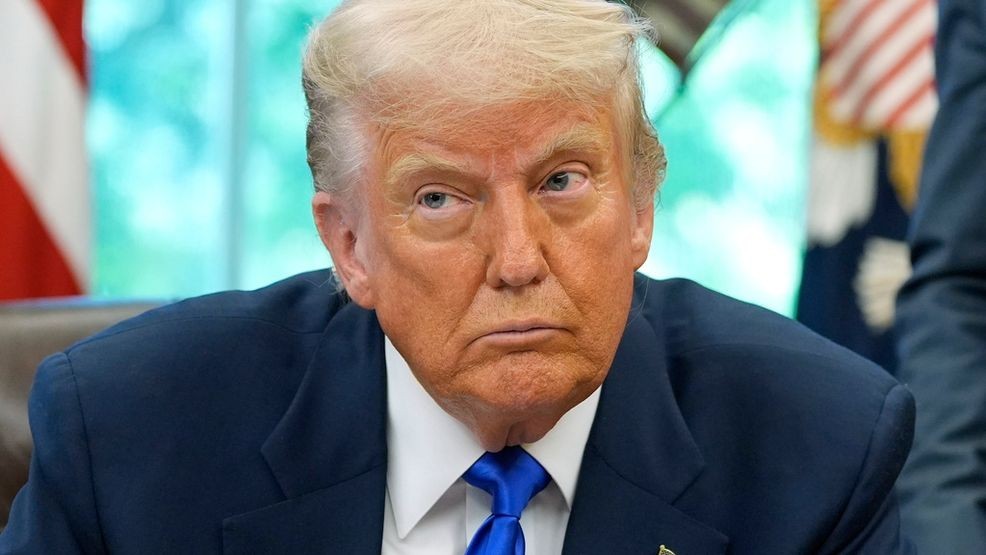WASHINGTON (TNND) — President Donald Trump’s latest push for new tariffs could put America’s most valuable exporters in the crosshairs of a trade war after he suggested movies filmed abroad could soon be hit with levies to bring production back to the United States.
Prior to this weekend, his aggressive tariff policy and trade wars had focused on goods like cars, computers, food and clothes that only account for less than a quarter of the economy. But now, a new and larger sector of the American economy could get targeted in retaliatory trade wars with Trump’s push to institute an import tax on movies filmed overseas.
Movies are part of the services sector, which includes other major industries and companies like Google, Netflix and JPMorgan Chase that do not send out hard goods but software, expertise and other services that make the U.S. the largest exporter in the world.
In a post on Truth Social over the weekend, Trump said the administration would put a 100% tariff on all movies that are produced overseas to counter incentives other countries offer production companies to film there.
“The Movie Industry in America is DYING a very fast death. Other Countries are offering all sorts of incentives to draw our filmmakers and studios away from the United States,” he wrote. “This is a concerted effort by other Nations and, therefore, a National Security threat. It is, in addition to everything else, messaging and propaganda!”
Trump told reporters on Monday that he wanted to meet with the industry before a movie tariff went into place “to make sure they’re happy about it.”
Many pieces of the policy, including whether it will go into effect, remain to be seen. The White House partially walked back the threat of the tariffs on Monday after backlash from studios and other industry groups and questions about how a tariff on films would work. The administration would have to figure out how to place a value on a movie to apply tariffs to it and what the threshold is to classify it as an imported product.
Adding tariffs to movies would open an entire new front in the trade wars that has been mostly avoided to this point by putting the U.S. services sector that accounts for more than 75% of total economic output that brought more than $1 trillion into the country last year. America had a trade surplus of almost $300 billion in services last year.
“In a trade war, the only way to win is not to play. And if we start a tariff war on services, that would be extremely true,” said Ryan Young, a senior fellow at the Competitive Enterprise Institute. “If you set that precedent with movies, even $15 billion is a pretty big deal, but you also open up retaliations against $300 billion of a trade surplus. If part of Trump’s objective is to have a trade surplus, why on earth is he putting tariffs on goods where the U.S. has one naturally?”
The U.S. is the biggest exporter of services in the world that could then be targeted by retaliatory measures hitting companies in technology, entertainment, banking and streaming services. Like the movie tariff, there are questions about how easily a country could impose tariffs on American services, but they could take other routes like taxes, fines or bans.
Many of the countries that have been hit by Trump’s tariffs have a services deficit with the U.S., a list that includes places like China, Canada, Mexico and Europe.
Washington and Beijing are locked in a bitter trade war that could lead China to outright ban American tech companies or other products from operating there at all, putting a significant dent in companies’ potential profits by getting locked out of the world’s second-largest economy. The European Union has already suggested it could go after major U.S. tech companies in response to tariff threats and the “Liberation Day” levies that have since been dialed back as a point of leverage in a trade war.
The services sector has also not been hit as hard by the tariffs and effects they are having on the economy so far. Activity for services climbed in April despite whiplash trade policy from the White House that has prompted fears of a recession and higher prices for consumers. While major manufacturers have pulled back profit forecasts and voiced concerns about massive tariff bills, services companies have seen more stability in their outlooks.
The Institute for Supply Management’s Services PMI hit the highest level since January of 2023 in April. Businesses included in the survey referenced price impacts of concerns about tariffs more often than uncertainty and future pressures, a contrast from manufacturers that are facing all three issues.
“Respondents continue to mention federal agency budget cuts as a drag on business, but overall, results are improving,” said Steve Miller, chairman of ISM’s Services Business Survey Committee.


